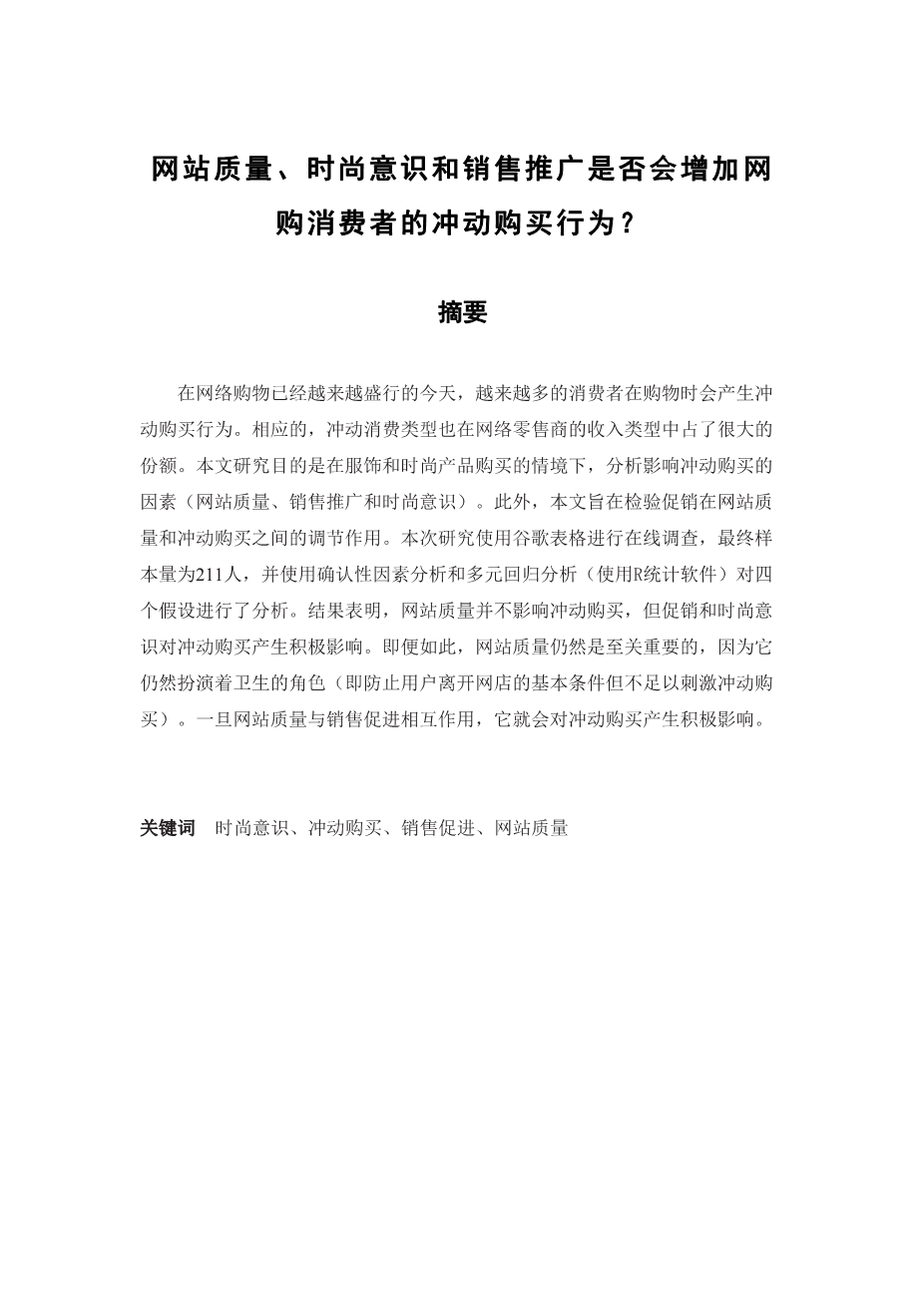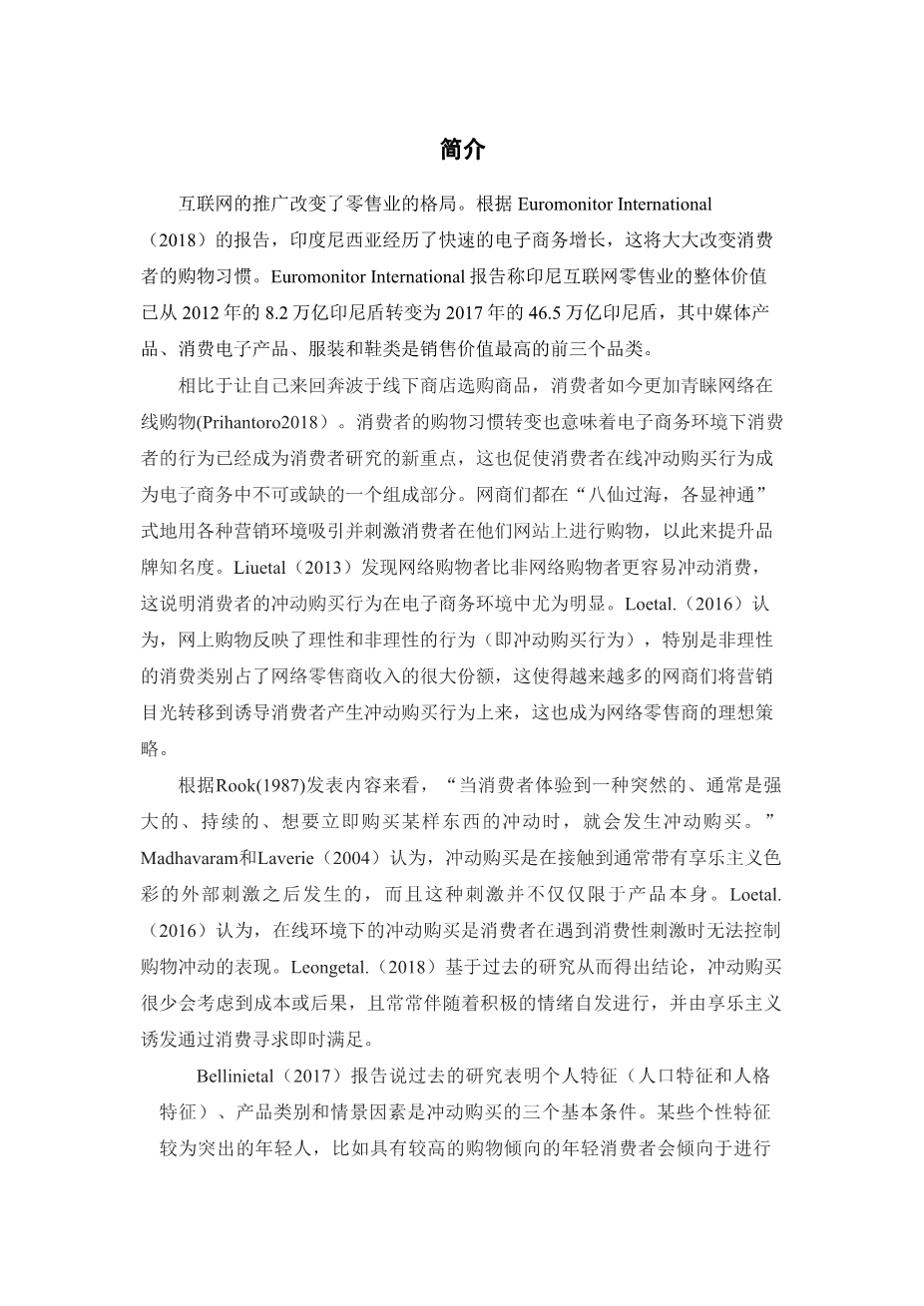Indonesian Journal of Business and Entrepreneurship, Vol. 6 No. 1, January 2020
Permalink/DOI: http://dx.doi.org/10.17358/IJBE.6.1.74 Available online at http://journal.ipb.ac.id/index.php/ijbe
Accredited SINTA 2 by Ministry of RTHE Number 30/E/KPT/2018
DO WEBSITE QUALITY, FASHION CONSCIOUSNESS, AND SALES PROMOTION INCREASE IMPULSE BUYING BEHAVIOR OF E-COMMERCE BUYERS?
Allysha Tiffany Wiranata*) and Arga Hananto**)1
*) International Undergraduate Class, Faculty of Economics and Business, Universitas Indonesia Jl. Prof. Dr. Sumitro Djojohadikusumo, UI Depok 16424
**) Department of Management, Faculty of Economics and Business, Universitas Indonesia Jl. Prof. Dr. Sumitro Djojohadikusumo, UI Depok 16424
Abstract: The prevalence of online shopping also gave rise to irrational shopping behavior like impulse buying, which makes up a large share of e-retailer revenue. This studyrsquo;s objective was to analyze the factors that affect impulse buying (i.e., website quality, sales promotion, and fashion consciousness) within the context of apparel/fashion product purchase. Besides, this study also sought to examine the role of sales promotion in moderating the relationship between website quality and impulse buying. An online survey with a final sample size of 211 respondents was carried out using Google Forms and analyzed with Confirmatory Factor Analysis and multiple regression analysis (using R Statistical Software) to analyze four hypotheses. The result indicated that website quality did not affect impulse buying, while sales promotion and fashion consciousness was found to affect impulse buying positively. However, the role of website quality was still critical, since it still played a role as a hygiene factor. Once website quality interacted with sales promotion, it could positively affect impulse buying.
Keywords: fashion consciousness, impulse buying, sales promotion, website quality
Abstrak: Meningkatnya belanja on-line juga meningkatkan timbulnya perilaku belanja tidak rasional seperti pembelian secara impuls, yang memberikan kontribusi besar terhadap pelaku e-commerce. Penelitian ini bertujuan untuk menganalisis faktor-faktor yang mempengaruhi pembelian secara impuls (yaitu kualitas situs web, promosi penjualan, dan kesadaran fashion) dengan menggunakan konteks pembelian produk pakaian/fashion. Selain itu, penelitian ini juga bertujuan menganalisis pengaruh promosi penjualan dalam memoderasi hubungan antara kualitas situs web dan pembelian secara impuls. Survei daring dilakukan dengan menggunakan Google Forms. Survei ini menghasilkan sampel akhir dengan jumlah sebanyak 211 responden. Data dianalisis dengan Confirmatory Factor Analysis dan analisis regresi berganda (dengan R Statistical Software) untuk menganalisis empat hipotesis. Hasil penelitian ini menunjukkan bahwa kualitas situs web tidak berpengaruh terhadap pembelian secara impuls, sementara promosi penjualan dan kesadaran fashion berpengaruh positif terhadap pembelian secara impuls. Walapun begitu, peran kualitas situs web tetaplah penting, sebab kualitas situs web berperan sebagai faktor hygiene dan apabila kualitas situs web berinteraksi dengan promosi penjualan, maka interaksi kedua variabel tersebut dapat berpengaruh positif terhadap pembelian secara impuls.
Kata kunci: kesadaran fashion, kualitas website, pembelian impuls, promosi penjualan
1 Corresponding author:
74
Copyright copy; 2019, ISSN: 2407-5434; EISSN: 2407-7321
INTRODUCTION
The pervasive use of the internet has also shifted the retailing landscape. According to Euromonitor International (2018), Indonesia has experienced fast e-commerce growth that will significantly shift shopping habits. For instance, Euromonitor International reported that overall value of Indonesiarsquo;s internet retailing has shifted from IDR 8.2 trillion in 2012 to IDR 46.5 trillion in 2017, with media products, consumer electronics, and apparel and footwear being the top three categories with the highest sales value.
Online purchasing has started to become the consumerrsquo;s more preferred alternative to having to go to a store and spend time commuting to and from the store (Prihantoro et al. 2018). The shift toward internet retailing also means that consumer behavior research must also be aimed at how consumers react to stimuli in e-commerce setting. Online impulse buying behavior is an integral aspect of e-commerce, as there is increasing competition between e-commerce companies. They need to work harder to attract consumers to shop at their sites, often by creating impulsiveness through manipulating various marketing and environmental stimuli. Liu et al. (2013) found that internet shoppers were found to be more impulsive than non-internet-shoppers, indicating that impulse buying behavior is evident in e-commerce setting. Lo et al. (2016) suggested that online shopping reflected rational and irrational behavior (i.e., impulse buying behavior), and in particular, irrational behavior made up a large share of e-retailer revenue. This makes inducement of impulse buying behavior a desirable strategy for e-retailers.
According to Rook (1987), “Impulse buying occurs when a consumer experiences a sudden, often powerful and persistent urge to buy something immediately”. Madhavaram and Laverie (2004) suggested that impulse buying followed an exposure to an often hedonically charged external stimuli, and this stimuli were not limited to just the product. Lo et al.(2016) suggested that impulse buying in online settin
剩余内容已隐藏,支付完成后下载完整资料


英语译文共 19 页,剩余内容已隐藏,支付完成后下载完整资料
资料编号:[589365],资料为PDF文档或Word文档,PDF文档可免费转换为Word


